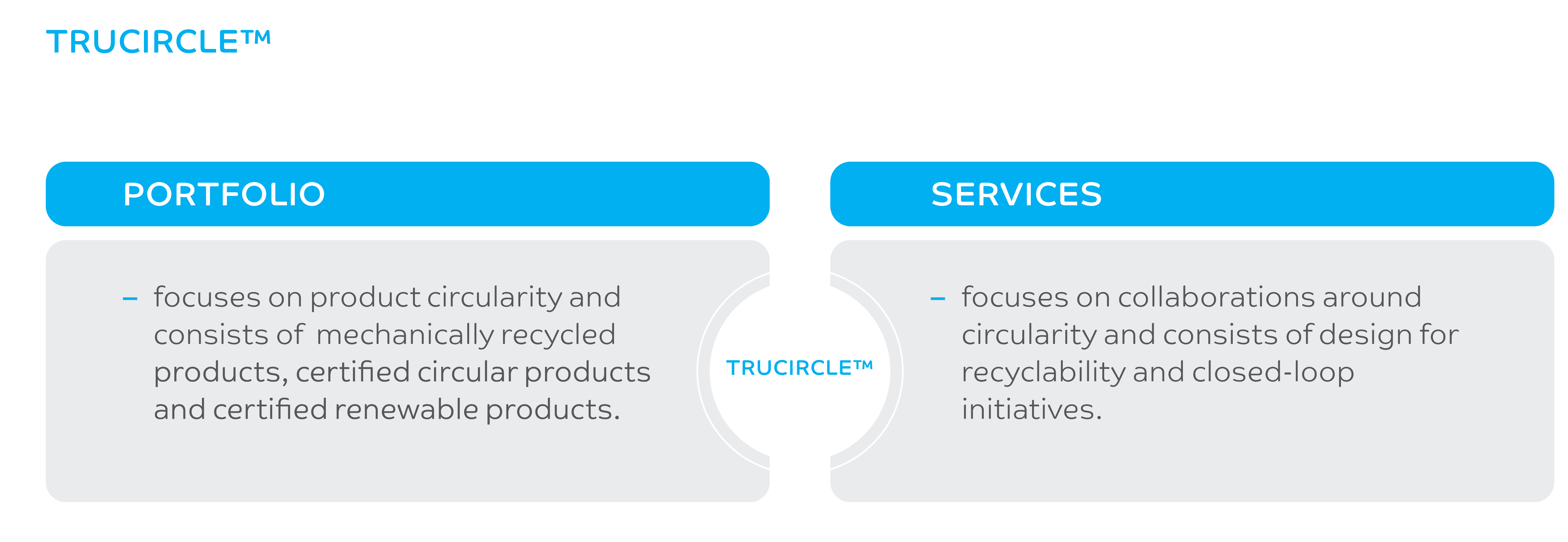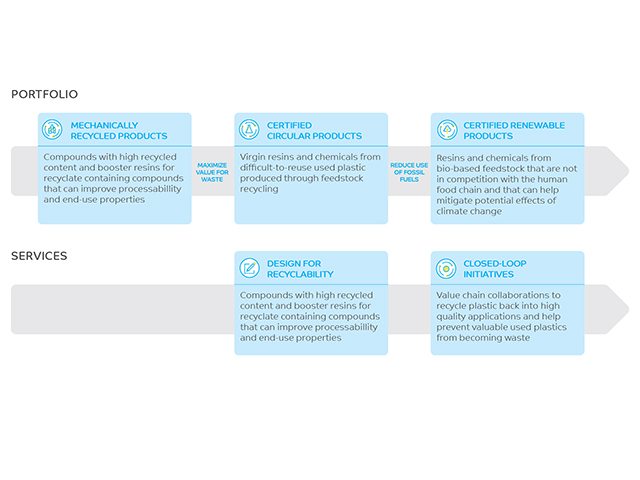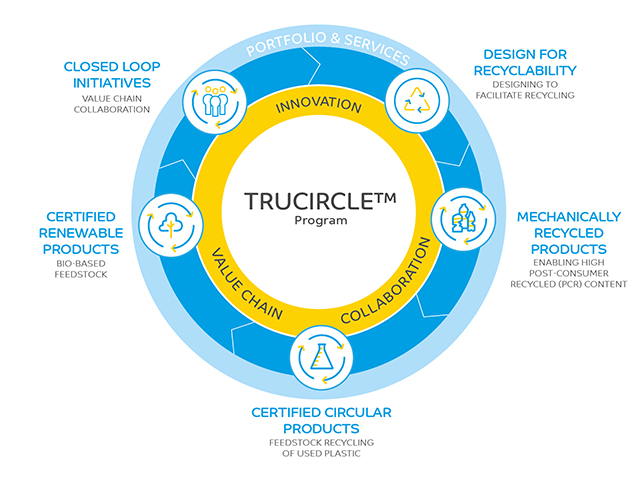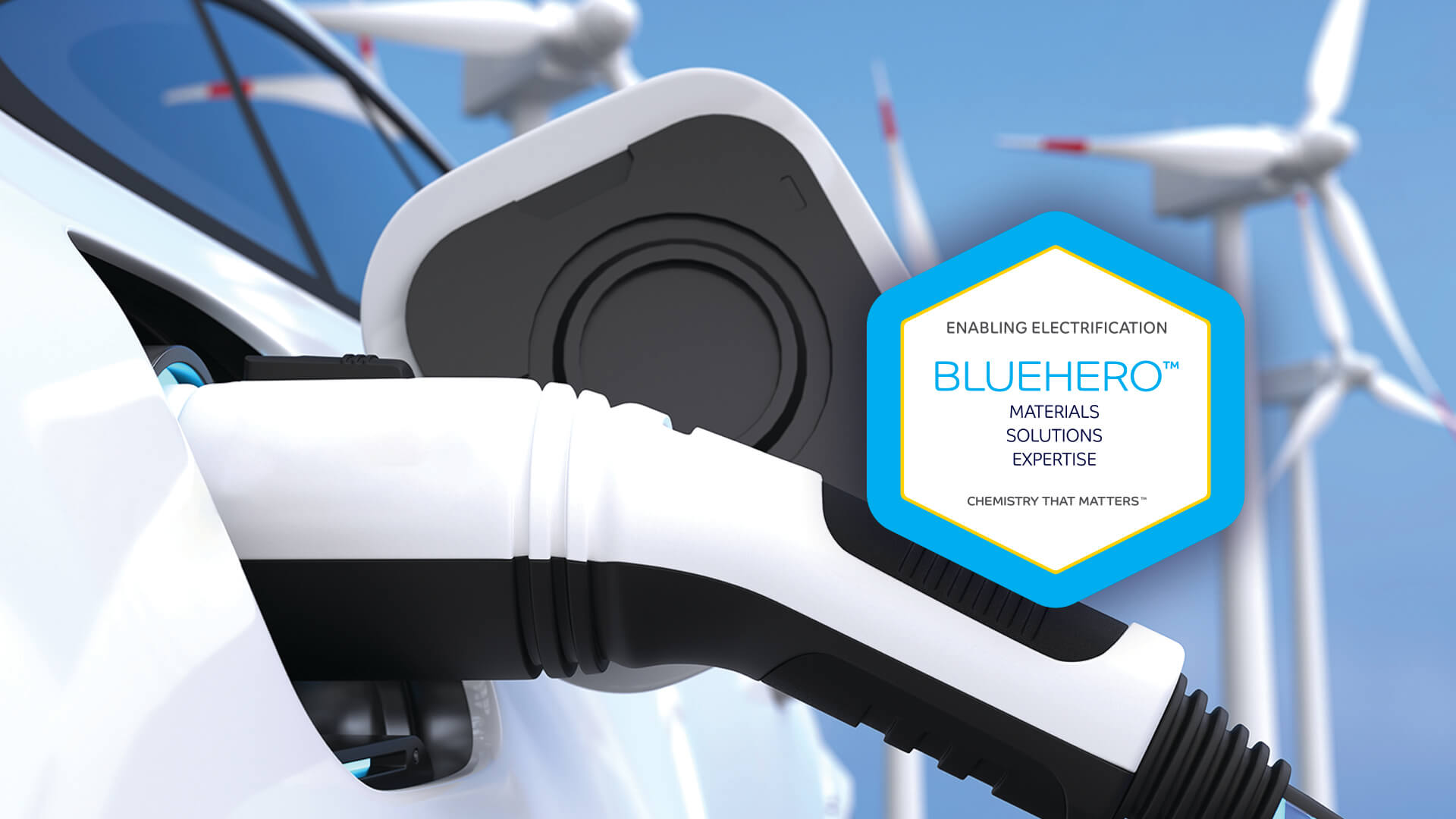Segment-Driven Approach
In pushing for sustainability in the Petrochemicals and Agri-Nutrients businesses, SABIC has directed its efforts toward recycled and bio-based feedstock and using renewable resources to design innovative new products and sustainable solutions for our customers.
Our goal to deliver sustainable products and applications that reduce carbon footprints without compromising high performance led to the creation of the TRUCIRCLE ™ and BLUEHERO ™ initiatives.


At the recent WEF Annual Meeting in Davos, SABIC unveiled its plans to process one million metric tons (1 ,000 kt) of TRUCIRCLE ™ solutions annually by 2030, reaffirming its pledge to accelerate the circular carbon economy. In order to fulfil this ambition and meet the 2030 target, SABIC aims to upscale the volume of globally-advanced, recycled, as well as bio-based materials, as catalogued in the various initiatives below.
Under the TRUCIRCLE™ portfolio, we developed a variety of innovative applications used across the value chain especially in the packaging industry. In the past three years, SABIC has focused its efforts on five key drivers to address challenges faced by the market: reducing waste; increasing circularity; closing the loop & reusing ocean-bound plastic; using bio-based feedstock solutions; and enhanced functionality and consumer appeal. These projects build on previous commitments to close the loop on soft plastic goods packaging, along with new pledges to create materials using renewable residues from vegetable oil processing.

REDUCING WASTE
Using durable, lightweight, and mono-material solutions and applications designed for recycling is one of the most effective strategies to decrease waste. In 2022, SABIC undertook the following measures to contribute to waste reduction.
HEAT-RESISTANT MONO-POLYETHYLENE (PE) POUCHES
SABIC collaborated with Covestro to develop a new heat-resistant coating resin technology for BOPE films, engineered specifically for recyclable, mono-material stand-up pouches. A viable solution to replace polyethylene terephthalate (PET) or Polyamide (PA) laminates in stand-up pouches, this transparent coating solution is in the trial phase; it has been tested in collaboration with Verpakkingsindustrie Veenendaal (VIV) and Volpak to validate a broader sealing temperature window when processing on FFS lines. The solution prevents the film from shrinking and from sticking to heat seal bars. The new recyclable mono-material stand-up pouch structure will push the flexible packaging industry to achieve a circular economy as a viable alternative to PET or PA laminates.
SUSTAINABLE FOAMED PACKAGING SOLUTIONS
SABIC partnered with IP Verpackung to develop two solutions: a food tray using a re-usable recyclable PP-UMS resin, a new generation of high-melt strength, foamable PP solutions; and a foam blow-molded bottle from SABIC made with chemical and mechanical recycled content from our TRUCIRCLE™ portfolio that is both cost-effective and offers up to 25% savings in weight.
INCREASING CIRCULARITY
Our certified circular polymers, based on a mass balance accounting approach according to ISCC PLUS, validate the feedstock content that comes from advanced recycling of mixed plastic waste. In 2022, SABIC processed 2.6 kt of pyrolysis oil in its crackers along with an additional 10 kt of renewable feedstock. The first commercial advanced recycling unit at Geleen, The Netherlands, is in the final stages of construction and will significantly upscale production of certified circular polymers derived from used plastic to expand the possibilities within the TRUCIRCLE™ ecosystem. In addition, we undertook a wide range of efforts to expand our solutions to increase circularity.
BLOCKCHAIN PILOT PROJECT
SABIC, in collaboration with technology company Finboot, advanced recycling pioneer Plastic Energy, and packaging specialist Intraplás, embarked on a pilot project to research the ways in which blockchain technology can enable end-to-end digital traceability of circular feedstock in customer products. The objective is to validate the feasibility of using a blockchain-based, value-chain IT application to trace a product across every step of the supply chain. In doing so, the project should lower costs, save time, and improve data integration for all value chain partners and validate sustainability proof points as well as organizations’ ESG credentials. The potential in this blockchain technology is significant, and will help to reduce the risk of human error in the certification process of materials.
FRESH-CUT SALAD BAGS
SABIC collaborated with Bonduelle to deliver a premium range of fresh-cut salad packaging made from certified circular SABIC® biaxially oriented polypropylene (BOPP) polymer produced by advanced recycling of post-consumer plastics that comply with food-contact regulations and contain 30% recycled content via mass balance certification. Additionally, they are fully recyclable in flexible packaging polyolefin waste streams.
GABRIEL-CHEMIE
SABIC identified a need for a cosmetic packaging solution that was recyclable, refillable, reusable, or recoverable, preserved the quality of the product and reduced its environmental footprint without compromising processing. Using certified polymers from the TRUCIRCLE™ portfolio, SABIC developed masterbatch samples for Gabriel-Chemie, one of Europe’s leading masterbatch manufacturers, that can be broken down to produce purified chemical products and used as a feedstock to recreate high-performance plastics back to a virgin PE.
CHANEL
SABIC developed a cosmetic packaging tube that supports circular solutions and full recyclability in line with strict cosmetic industry standards without affecting the tube’s content quality. The tube was made with certified circular polymers from SABIC’s TRUCIRCLE™ portfolio produced through the advanced recycling of mixed and used post-consumer plastics. The pyrolysis oil produced is used as feedstock to create certified circular polymers with the same properties as virgin material. Our collaboration with Chanel showcases how advanced recycling solutions can add value to recycled content in cosmetic packaging.
SPECIALTY FILMS IN ABSORBENT HYGIENE APPLICATIONS
SABIC teamed up with Plastik Group, a major international manufacturer of films and bags for the hygiene market, and Drylock Technologies to use certified circular polymers from SABIC’s TRUCIRCLE™ portfolio to develop specialty films to use in absorbent hygiene applications, such as sanitary pads, panty liners, towels and diapers in feminine, baby, and incontinence care. The TRUCIRCLE™ initiative is part of our initiative towards developing solutions for single-use disposable absorbent hygiene products. The partnership will boost efficiency and help to reduce the waste ending up in landfill sites or incineration plants while serving as a role model for responsible, circular product solutions.
ELLA’S KITCHEN AND GUALAPACK
SABIC collaborated with Ella’s Kitchen, the numberone baby-food brand in the UK, to develop a baby-food cap made with advanced recycled plastics for over 3.5 million of Ella’s Kitchen’s Organic Strawberries and Apples pouches starting from January 2022. Using certified circular polymers from SABIC’s TRUCIRCLE™ portfolio, these resins will be utilized by Gualapack, market leader of spouted pouches in the baby-food segment and supplier to Ella’s Kitchen, to produce the cap. In the process, Ella’s Kitchen became the first company in the baby-food category to use SABIC’s TRUCIRCLE™ certified circular polymers as part of the company’s wider commitment to make all of its packaging widely recyclable by 2024.
CLOSING THE LOOP & REUSING OCEAN BOUND PLASTIC
A challenge in achieving circularity is developing solutions that will effectively close the loop of plastic packaging. Another involves utilizing the vast amounts of ocean-bound plastic polluting coastal areas in the material stream of new packaging products. By tackling the problem on two fronts, SABIC has made significant headwinds in this approach in 2022.
POLIVOUGA AND NUEVA PESCANOVA
As part of our initiative to reduce plastics that end up in our oceans, we collaborated with Portuguese flexible-film-products manufacturer, Polivouga, to develop a new pioneering TRUCIRCLE™ project to convert reused post-consumer plastic waste recovered from areas up to 50 km inland from waterways into a new sustainable seafood packaging solution. It was launched on June 8, 2022, to coincide with World Oceans Day 2022 and in collaboration with the Nueva Pescanova Group, a leading Spanish brand owner specializing in the fishing, farming, processing and marketing of fresh, chilled and frozen seafood products. This venture marks SABIC’s first TRUCIRCLE™ project to use recycled ocean-bound plastic in certified circular polyethylene and food packaging solutions to reduce the amount of plastic that ends up in the seas.
UPM RATAFLAC
SABIC teamed up with UPM Rataflac to launch the world’s first packaging label material made from SABIC® certified circular polypropylene (PP) based on advanced, recycled ocean-bound plastic (OBP) ethically collected from South-East-Asian beaches and islands and audited. The labels will help reduce plastic waste and align with our TRUCIRCLE™ program vision of circular solutions.
MESS-FREE MICROWAVABLE HEINZ BEANZ SNAP POTS
SABIC has teamed up with Heinz, Tesco and Berry in a recycling trial in the UK that aims to close the loop on soft-plastic-goods packaging using certified circular PP from SABIC’s TRUCIRCLE™ portfolio for microwavable Heinz Beanz Snap Pots. The project encourages consumers to return their soft-plastic packaging to collection points set up at various Tesco stores. The packaging is subsequently converted into pyrolysis oil, via a thermal anaerobic conversion process that SABIC uses to produce the certified circular PP. Berry Global, a leading supplier of packaging solutions, uses these pellets to manufacture the new Beanz Snap Pots and sends them to Heinz. In turn, the empty pots and sleeves can be returned to designated collection points as part of the closed-loop project.
KIND® SNACK BAR PACKAGING FROM MARS AND LANDBELL GROUP
We joined forces with Mars and Landbell Group on an advanced recycling project to develop BOPP film based on SABIC’s TRUCIRCLE™ certified circular PP from feedstock recycling of post-consumer used plastics to close the loop on flexible packaging. Mars introduced the new BOPP film in packing its KIND® primary healthy snack-bar brand. Landbell collected and sorted mixed plastics and delivered the mixed materials to Plastic Energy, to be converted into pyrolysis oil via a patented thermal anaerobic conversion process. The pyrolysis oil is an alternative feedstock in SABIC’s production process of virgin-quality food-contact-approved PP polymer. The project helped Mars to contribute to a circular economy to recycle, reuse, or compost all packaging material to aid its sustainable packaging journey.
PROCTER & GAMBLE
Our joint pilot project with Procter & Gamble (P&G) and Fraunhofer resulted in a sustainable closed-loop solution to reduce critical waste and mitigate resource depletion of single-use facemasks discarded in public spaces during the COVID-19 pandemic. P&G sites in Germany collected all facemasks worn by employees and visitors, automatically shredding and converting them to pyrolysis oil that SABIC uses as feedstock in the production of certified circular PURECARES PP resin, which we then supply to P&G to process into nonwoven fibers material.
RECYCLING OCEAN-BOUND PET BOTTLES FOR UPCYCLING POLYBUTYLENE TEREPHTHALATE
In our efforts to mitigate plastic waste that ends up in the seas, our R&D 100 Award-winning LNP™ ELCRIN™ WF0061BiQ resin uses ocean-bound PET bottles as a feed stream for chemical upcycling into polybutylene terephthalate (PBT) resin. It is the latest addition to SABIC’s extensive portfolio of chemically upcycled LNP ELCRIN iQ materials that support circularity.
USING BIO-BASED FEEDSTOCK SOLUTIONS
Our certified renewable solutions do not compete with human-food or animal-feed production and are ISCC PLUS mass balance accredited. This year, SABIC’s efforts to use certified renewable feedstock spanned different industries.
MATTEL
SABIC collaborated with Mattel to incorporate certified renewable polymers from SABIC’s TRUCIRCLE™ program across Mattel’s product range to support the leading global toy company’s goal to achieve 100% recycled, recyclable or bio-based plastic materials in all its products and packaging by 2030. This is a huge step as Mattel is the first company in the toy industry to work with SABIC to develop high-quality new plastic applications.
W. MÜLLER GMBH
SABIC and W. Müller GMBH collaborated to develop a recyclable bottle that uses certified renewable high-density polyethylene (HDPE) polymer from SABIC’s TRUCIRCLE™ portfolio for the inner layer and SABIC® HDPE mechanical recycled compounds for the core and outer layers. The bottles are a drop-in solution for replacing fossil-based plastics with no compromise on food safety. It contributes to circularity by saving the use of virgin material in bottles without facing processing issues or machine-efficiency reduction and upholding bottle-quality standards.
CHIP BAGS
SABIC, Orkla, and IRPLAST launched a chips packaging using certified renewable PP polymer in substitution of fossil-based plastics in the packaging that does not compromise on food safety, and is converted into a BOPP or Natural BOPP (NOPP) food packaging film by IRPLAST. The material solution from bio-based feedstock will lower the carbon footprint of all three partners’ value chain by about 50% compared to the use of traditional non-renewable plastics.
ENHANCED CONSUMER APPEAL AND CONVENIENCE
Although consumers are in favor of sustainable solutions, they expect advanced new packaging products to offer a highly salient aesthetic appeal and user convenience. In 2022, SABIC kept this pillar in mind when working on new projects with its partners to produce sustainable packaging products for popular consumable items.
TEA CAPSULES
SABIC and Melitta Single Portions used a food-grade SABIC® QRYSTAL PP copolymer with certified feedstock from recycled used plastic waste to create a new capsule for the Avoury® tea brand that is transparent, lightweight, and aesthetic while supporting up to 80% reduction of fossil depletion versus conventional designs.
ICE CREAM CUPS
SABIC and the Piber Group developed SABIC PP PHC60, an impact copolymer aimed to be used for chilled and frozen foods packaging, which offers up to 40% higher drop impact performance, thereby reducing material consumption and saving costs.
YOGHURT CUPS
SABIC and NESTAL collaborated to transfer the technology of injection-compression molding (ICM) to the thin-wall packaging market to create lightweight yet stiff and stackable, aesthetic yoghurt cups molded in a phthalate-free SABIC PP FLOWPACT grade that ensures high product safety at lower material consumption.
BLUEHERO™
BLUEHERO™ is a new initiative aimed at delivering solutions that accelerate the world’s energy transition to electric power in a bid to move toward a cleaner environment for the benefit of future generations. The expansive ecosystem of BLUEHERO™ initially focused on supporting the automotive industry’s mission to create safer and more efficient EVs by improving structural battery components using unique flame-retardant materials and solution-development expertise, and leveraging specific knowledge and expertise around large-part injection molding, compression molding, advanced injection molding, and polymer flame interaction. In time, BLUEHERO™ intends to strengthen and expand its thermoplastic offering to help enable electrification with new investments.

BLUEHERO™ is a new initiative aimed at delivering solutions that accelerate the world’s energy transition to electric power.
Our aim is to support the automotive industry to shift over 70% of vehicles to electrification by 2030. To this effort, Original Equipment Manufacturers (OEMs) have committed US$ 560 billion to deliver industry solutions across all verticals— materials; manufacturing; assembly; fire-polymer interaction; application/verification; and solution development. Our objective is to deliver industry-specific solutions that cater to the evolving needs of the automation industry, including lightweight and cost-effective products with lower environmental impact, and enhanced safety and performance standards. In addition, SABIC is eyeing a 2030 ambition of achieving over 150 kt in resin sales to establish SABIC’s position as a leader.
THE BATTERY SHOW EUROPE 2022
SABIC showcased its BLUEHERO™ electrification initiative for the first time at The Battery Show Europe 2022 in Stuttgart, Germany. The company highlighted its comprehensive materials offering and expertise for next-generation batteries and energy-storage applications, emphasizing its commitment to support the shift to electric power. SABIC presented its results from a stringent test based on the new UL standard 2596, demonstrating how the new solution combined pressure, ablative force, heat, and fire into one repeated test, packing 25 battery cells (type 18650) into a steel box and then heating two cells to the point of thermal runaway. The pressure from the explosion was higher than the requirements of several OEMs; a 4 mm sheet of STAMAX™ flame retardant resin, a long glass fiber polypropylene material, passed this test six times without displaying any perforation.
THE BATTERY SHOW NORTH AMERICA 2022
At The Battery Show North America 2022, SABIC continued to exhibit its materials, solutions, and expertise under the BLUEHERO™ initiative, including:
– An all-plastic prototype EV battery tray with integrated cooling channels and crash protection elements.
– A prototype plastic honeycomb structure in XENOY™ HTX resin for possible battery pack side impact protection, significantly lighter and lower in costs compared to using metal.
